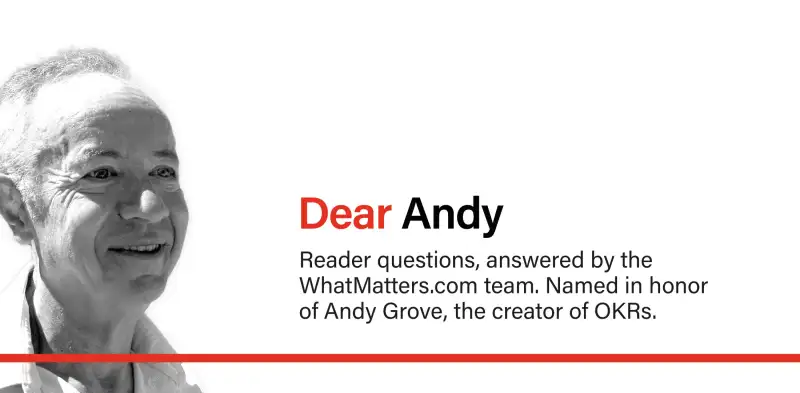Dear Andy,
My company has recently decided to join the 21st century and get on social media. I’ve been tasked with leading the charge, but am pretty unfamiliar with that world and don’t really know where to start. Do you think OKRs would help?
Sincerely,
Janelle

Hi Janelle,
Thank you so much for writing in.
Social media can seem like the Wild West at first, so you are far from alone feeling uncertain. With all the apps, taps, and clapbacks, it can be difficult to know where to begin. I’ve got a couple ideas, however, that can hopefully set you down the right path.
The first step is to identify your Objective. What are you hoping social media will do for your company? It can be tempting for companies to create accounts simply for the sake of having them, but it’s helpful to get more specific. Whether you’re looking to raise brand awareness, connect directly with customers, or simply add some humanity to your company’s image, a decisive and focused strategy is imperative.
The next step is to identify your KRs. The metrics-based nature of social media will make your KRs incredibly easy to measure — the only issue is deciphering which are most important. This may take a little bit of time, but you need to identify the benchmarks that will tell you whether or not your Objective is working. If you’re looking to raise brand awareness, perhaps you could aim to hit 5k followers on Twitter by the end of the cycle. If you’re looking to connect more directly with customers, you could aim to respond to all comments on your Facebook page within 24 hours. There are so many many different metrics to choose from — make sure you’re measuring what matters.
In that same vein, I’d also recommend not biting off more than you can chew when first starting off. There are so many different social media platforms out there — don’t feel that you need to start using all of them at once. Some businesses are much better suited to LinkedIn, some Instagram, etc. It may be a good idea to use this first cycle as an exploratory expedition. Where are your customers are most engaged? Which one/ones will make most sense for your business?
Need a hypothetical example? I’ve got one right here for you:
Well Janelle, I hope this has been helpful for you. One of the biggest perks of social media is the readily available and diverse set of metrics each platform provides. That takes care of the “measuring” part — it’s up to you to decide what matters.
Sincerely,
Billy from the What Matters Team

Have a question for Dear Andy? Click here to submit your OKR queries.
